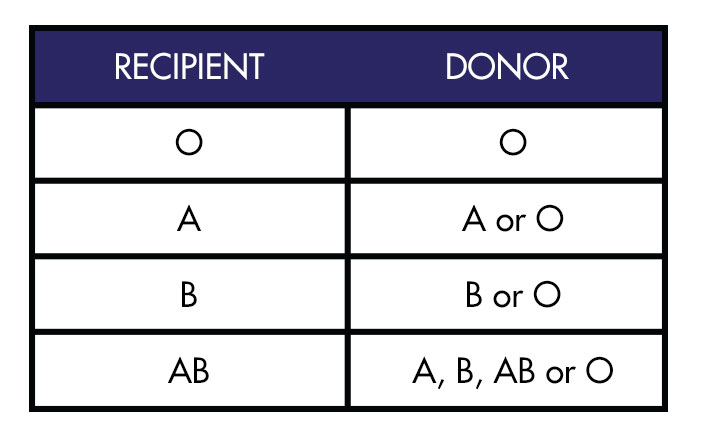Kidney Donation Process
In order to qualify as a living donor, an individual must be physically fit, in good general health, and free from high blood pressure, diabetes, cancer, kidney disease, and heart disease.
Qualifications for Living Donors
Read the information below to find out if you qualify
Individuals considered for living donation are usually between 18-60 years of age. Gender and race are not factors in determining a successful match. The living donor must first undergo a blood test to determine blood type compatibility with the recipient.
Blood Type Compatibility Chart

If the donor and recipient have compatible blood types, the donor undergoes a medical history review and a complete physical examination. The following tests may be performed:
Tissue Typing: the donor’s blood is drawn for tissue typing of the white blood cells.
Crossmatching: a blood test is done before the transplant to see if the potential recipient will react to the donor organ. If the crossmatch is “positive,” then the donor and patient are incompatible. If the crossmatch is “negative,” then the transplant may proceed. Crossmatching is routinely performed for kidney and pancreas transplants.
Antibody Screen: an antibody is a protein substance made by the body’s immune system in response to an antigen (a foreign substance; for example, a transplanted organ, blood transfusion, virus, or pregnancy). Because the antibodies attack the transplanted organ, the antibody screen tests for panel reactive antibody (PRA). The white blood cells of the donor and the serum of the recipient are mixed to see if there are antibodies in the recipient that react with the antigens of the donor.
Urine Tests: In the case of a kidney donation, urine samples are collected for 24 hours to assess the donor’s kidney function.
X-rays: A chest X-ray and an electrocardiogram (EKG) are performed to screen the donor for heart and lung disease.
Arteriogram: This final set of tests involves injecting a liquid that is visible under X-ray into the blood vessels to view the organ to be donated. This procedure is usually done on an outpatient basis, but in some cases it may require an overnight hospital stay.
Psychiatric and/or psychological evaluation: The donor and the recipient may undergo a psychiatric and/or psychological evaluation. The decision to become a living donor is a voluntary one, and the donor may change his or her mind at any time during the process. The donor’s decision and reasons are kept confidential.
Copyright © 2003 United Network for Organ Sharing. www.unos.org. All rights reserved.
